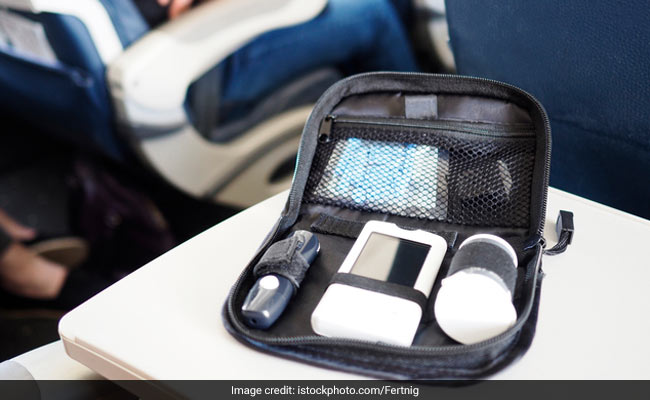Diabetics need to take a little extra precaution to make sure their travels are fun and enjoyable.

Preparation is the key to success travelling for diabetics
HIGHLIGHTS
- Preparation is the key to successful traveling when you have diabetes.
- Extra supplies, including insulin are necessary for diabetic travellers.
- Diabetics should monitor blood glucose levels regularly while travelling.
Traveling for work or for holidays, should be enjoyable. If you have diabetes, a little extra preparation can help make your trip one to remember, for all the right reasons!
Checklist
- Carry twice the amount of diabetes medication and supplies than you had normally needed.
- Obtain sufficient prescriptions for insulin, oral hypoglycemic agents and keto-diastix (if on insulin).
- If traveling with someone, give some of your medicines to your traveling companion, in case you lose yours.
- If traveling by air, never put insulin in the suitcase. Low temperatures in the hold of an aircraft will cause insulin to freeze.
- Obtain a letter on introduction to doctor overseas, outlining your treatment and any other health problems. Another letter will be needed stating you have diabetes and authorizing your need to carry syringes and medications etc.
- Carry a list of all your current medicines (or take a repeat prescription sheet).
Carry a simple first-aid box, which should include:
- Simple pain killers like paracetamol (crocin)
- Anti-diarrhea capsules (Imodium)
- Antiseptic solution
- Always carry some emergency carbohydrate food e.g.; dried fruit, jelly beans, dry biscuits as departures can be delayed.
If you are on insulin
- Find out the types and strengths of insulin available in the country that you are traveling (in case of emergency). In India, U-40, U-100 is commonly used.
- For different strengths of insulin, one must use syringe of similar strength.
- Do not expose insulin to extreme temperatures. It should not be exposed to direct sunlight and should be kept at a cool place.
- Don't keep insulin in a glove compartment/dickey or dash box of the car. Carry a suitable storage container for insulin to prevent it from heat.
Remember that insulin may get absorbed faster in warmer climates; hence, the chances of a hypoglycemic attack might increase. Regular blood tests are therefore important as you may need to manage/reduce your dose of insulin.
Long-hault flights and changing time zones
- Prepare for a long journey well in advance by asking your Diabetes Educator to help you work out your insulin dose. Also, discuss the effects of time changes on your diabetes routine.
- Try to be flexible and be prepared for flight delays.
- If you are traveling, keep your watch at Indian time, which will help you to know how far you are from your usual eating time.
- Insulin and meals should be taken according to the current time at the place where the flight started, not according to the time of the country of destination.
Eating and drinking
- Carry sandwiches/biscuits or cereal bars to cover any unexpected delays in travel. Remember to take this in your hand luggage and not to put this in the hold of a plane.
- Take sweeteners with you i.e. sugar pouchs mishri
- Airline meals may not contain sufficient carbohydrate. It is better to ask for an "ordinary" meal rather than asking special "diabetic" meal, or to carry extra bread, a roll or fruit with you.
- Do not drink alcohol on an empty stomach. It is advised to avoid alcohol before and during flights in order to prevent dehydration, high blood glucose levels and fatigue. In hot climates drink plenty of sugar-free fluids to prevent dehydration.
Foot care
- Wear/carry comfortable, well-fitting shoes.
- Never go barefoot.
- On the beach, do not walk barefoot, especially on hot sand. Wear sandals or surf sandals to prevent injury.
- Watch out for sharp objects on the beach or while you are swimming.
- Inspect your feet every morning and evening for breaks.
- If you develop a blister, cover it with a sterile pad and keep it clean.
In a nutshell
- Preparation is the key to successful traveling when you have diabetes. See your doctor before the trip in order to address any issues that are relevant to your trip.
- Extra supplies, including insulin, test strips and carbohydrate food are a necessity. Make sure you know where supplies can be obtained at your destination, if needed.
- Blood glucose levels can be affected by flying and by changes to time, meals and activity levels when traveling. Monitor blood glucose levels regularly and be prepared to adjust your insulin accordingly.
DoctorNDTV is the one stop site for all your health needs providing the most credible health information, health news and tips with expert advice on healthy living, diet plans, informative videos etc. You can get the most relevant and accurate info you need about health problems like diabetes, cancer, pregnancy, HIV and AIDS, weight loss and many other lifestyle diseases. We have a panel of over 350 experts who help us develop content by giving their valuable inputs and bringing to us the latest in the world of healthcare.














